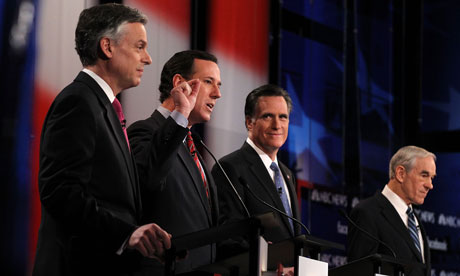 A TV debate with the US Republican presidential candidates, who have provided 'entertainment value'.
A TV debate with the US Republican presidential candidates, who have provided 'entertainment value'.The Guardian:
The centuries-old US political system is one to be admired. Yet ironically it's under threat from those who claim to be patriots
I'm hearing that again, as non-Americans watch not just the bizarre Republican presidential field but the paralysis of a US political system that has rendered an elected president apparently incapable of doing almost anything. The final straw came last August, when the US saw its credit rating downgraded after coming close to a default – all because Congress refused to raise the country's debt ceiling. Surely now, people wondered, I had given up my youthful enthusiasm for a set-up that could result in such madness?
But I confess the constipation embodied by the US Congress, the constant gridlock, has made me despair. A check on the executive is one thing; a triple-locked pair of handcuffs on the president's wrists, restraining him and his party from even, say, extending unemployment benefits to the needy, is quite different.
And yet this is not some inherent flaw in the US system, an outcome logically entailed by the founders' design and therefore unavoidable. On the contrary, it is the result of an abuse of the system, a consequence specifically of the march rightward of the Republican party.
Take the debt ceiling row. Congress never used to have a problem with that: the vote to raise the limit was always routine, nodded through 87 times since 1945, no matter which party was in charge. But today's Republicans seized on the chance to put a gun to the head of the US economy. Either the president caved to their demands or they were ready to see the country default. No wonder the credit agency Standard & Poor's declared as it took away America's triple-A rating that "the effectiveness, stability, and predictability of American policymaking and political institutions have weakened".
To be sure, that ability to hold the country to ransom was always there, buried within the rulebook. But convention and a shared assumption that no party would act blatantly against the national interest ensured those potential weapons lay dormant. Starting in the 1990s, under then-speaker Newt Gingrich, the Republicans cast aside those conventions, dismissing them as the cosy practices of Washington insiders, an offence against ideological purity. More important now is their Tea Party pledge to vote against any tax rise or new borrowing, no matter how damaging the impact.
Continue reading here.
No comments:
Post a Comment
Note: Only a member of this blog may post a comment.